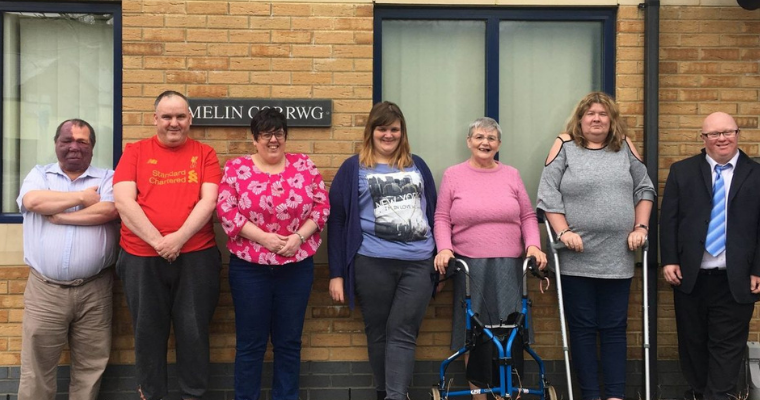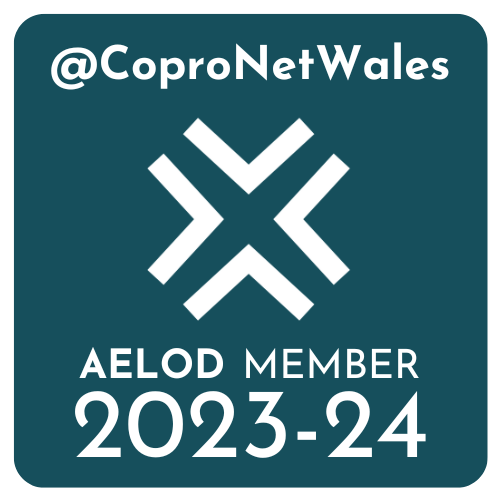Meet Lynne

In this ‘stories that matter’ series, we will introduce you to people who live or work in Rhondda Cynon Taf, Bridgend and Merthyr Tydfil to hear their story, and find out what matters to them when it comes to health, social care and wellbeing.

Although I had been going to a school around the corner from where I lived, I had difficulty learning there. It was felt the boarding school would be better for me.
I stayed in the boarding school all the time and didn’t go home. My father didn’t have a car and couldn’t drive, so I went home every third weekend. My mother used to come and visit me every Saturday by bus. It took her a long time to get there by bus to visit me.
The boarding school was okay when I got there, but I didn’t like the thought of going back once I’d spent time with my family.
At sixteen I left the school, and spent two years at home. I then went to a day centre when I was eighteen and spent my time there putting nails into bags; learning some skills to prepare me for work.
After a while, I went on a work placement at a factory in Porth for a few months. The factory was making parts for cars, and we did a bit of everything. It was a very busy job, and we had to make a certain amount of things in a day. They told me I wasn’t quick enough to do the work.
After the work placement, I went to do some office work in Cardiff, catching the bus every morning at 7.45. I was working on a computer, and again I was told I wasn’t quick enough.
I was there for three weeks and it was hard to hear that they felt I wasn’t “good enough” to do the work. I felt there was lots of barriers for me.
After the placement in Cardiff, I went back to the day centre and did some work experience in two playgroups in Porth and Penygraig. I worked in the playgroups for a long time, and I really enjoyed working with children. However, then I started having problems with my leg and I started to find it very tiring, so I left and went back to the day centre.

My friend and I heard about the People First movement, which had started in Canada as an advocacy group for people with learning disabilities. We knew they were interested in setting up a network in South Wales, so my friend and I travelled down to Cardiff to see what it was all about.
I was inspired to get involved with People First because I wanted to help people with learning disabilities have a voice.
We started to set up meetings with people across Wales, and even got a local advocacy group set up in my local day centre in Llwynypia. I’m proud to say this was the first local People First group set up in a day centre.
The People First movement started to grow, and we started forming a Mid-Glamorgan group across all the districts that surrounded that area.
From Caerphilly and Monmouthshire to Bridgend, Rhondda Cynon Taf and Merthyr Tydfil, we were coming together and growing. By the 1990s there were hundreds of people involved.
1990 was one of the most significant years of my life, as I met my friend Dawn. I was on a work placement at a charitable organisation in Ynyshir, supporting parents and carers of adults with learning disabilities.
Dawn was the “new girl on the block.” I felt a bit worried about change, but as we worked together more and more, our friendship grew.
As People First grew, we were looking for more people to support us with our mission. Dawn applied for the role as People First co-ordinator in 1996, and we worked even more closely together, engaging people with learning disabilities to help them have their voices heard.
I love (and still love!) working so closely with Dawn as I could see how passionate she was about helping people.

I was advocating for long-stay institutions to close down, and for people to have care in the community. Through my campaigning, I came across a lady called Victoria who was employed as an independent advocate at the time to help resettle people with learning disabilities back into the community. Victoria was also a learning disability nurse, and began working at the University of Glamorgan.
Victoria wanted to change the way learning disability courses for nurses were run for students, and she felt the best way to do this, was to ask people with learning disabilities to support with teaching the courses.
She asked me to support her with setting up this course. Victoria and I set up a group called Teaching Research Advisory Committee (TRAC), and we then encouraged people from South East Wales to join the group and we started teaching students around learning disabilities.
At the same time, I was working on a research project looking into the abuse of people with learning disabilities. The project employed people with learning disabilities, and I was the first person to go to a university ethics committee and for my project to be passed first time without any corrections.
This project has since won awards for its findings.
Due to all of my work with the university, I was awarded an Honorary Degree, and as a result I was made an honorary fellow of Glamorgan University.

I support all of the staff and mentor new members, by helping them to solve problems and help them think of creative ideas. I also help with funding applications.
I am proud to still be doing this with Dawn after thirty years. Meeting Dawn is my proudest achievement. She brought me out of myself.
After almost forty years of supporting people with learning disabilities, I have seen improvements. However things still aren’t right, and changes still need to be made.
I’d like to see people being more involved with people with learning disabilities in the community. I’d also like barriers to be removed so people with learning disabilities can find it easier to find paid work.
Accessibility is also very important. For example, I’d like for signposts in the street to be easier to read.
I’d also like it to be a bit easier to see the same healthcare professional every time. I like my doctor, and they understand me and my problems. Being able to see the same doctor is important to me and people with learning disabilities.
I am very proud of what we have achieved at People First, and I will continue to stand up for people with learning disabilities so they can have a voice and be involved in decisions that are being made.
Lynne’s experiences and feelings fed into our Assessment of Local Wellbeing and Need. Read about this here.

We are proud to be members of
Co-Production Network for Wales.
We are proud to be members of
Co-Production Network for Wales.